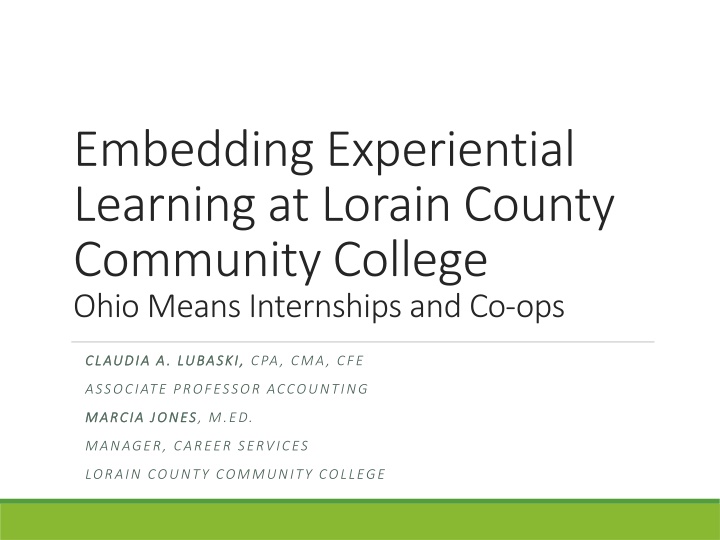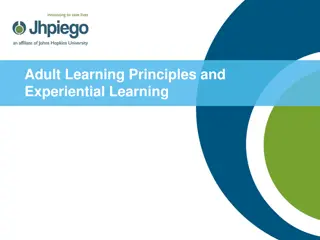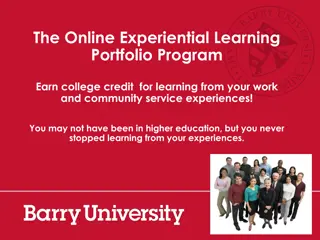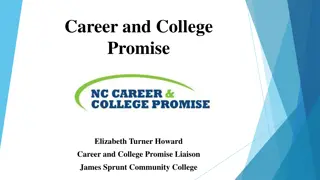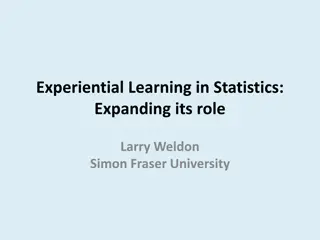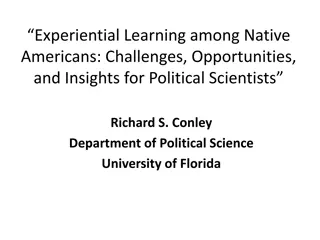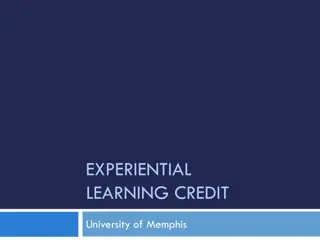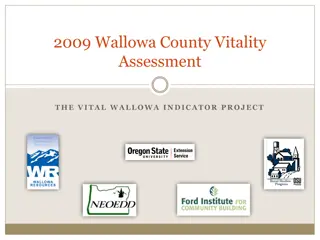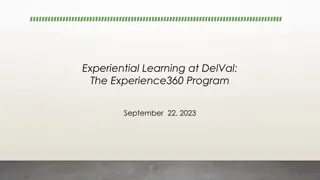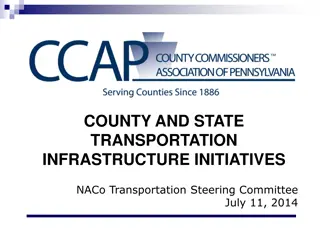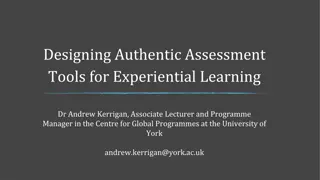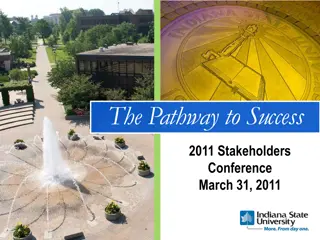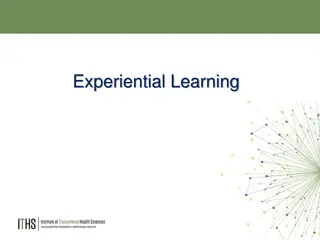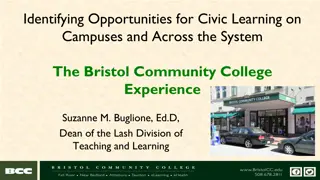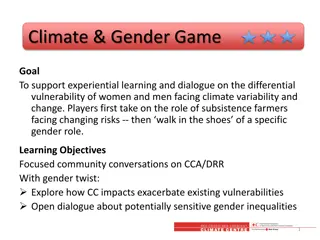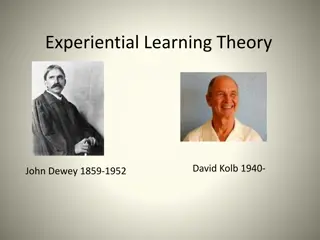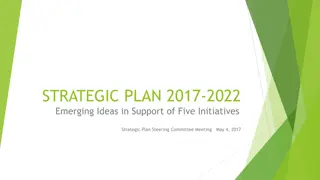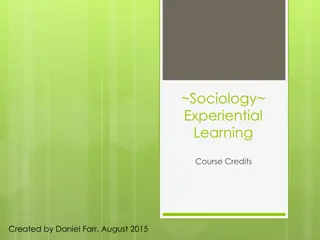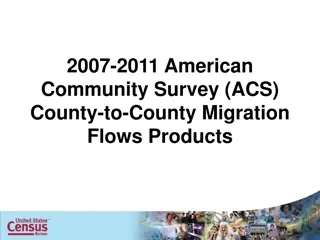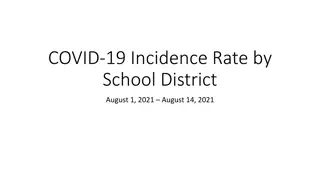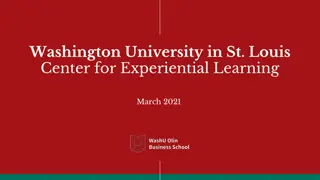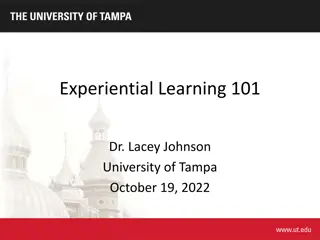Experiential Learning at Lorain County Community College
Define and explore the value of experiential learning at Lorain County Community College, highlighting its impact on student engagement and relevance to real-world issues. Understand the diverse benefits for historically underserved students and the campus-wide faculty acceptance towards embedding experiential learning in academic programs.
Download Presentation

Please find below an Image/Link to download the presentation.
The content on the website is provided AS IS for your information and personal use only. It may not be sold, licensed, or shared on other websites without obtaining consent from the author.If you encounter any issues during the download, it is possible that the publisher has removed the file from their server.
You are allowed to download the files provided on this website for personal or commercial use, subject to the condition that they are used lawfully. All files are the property of their respective owners.
The content on the website is provided AS IS for your information and personal use only. It may not be sold, licensed, or shared on other websites without obtaining consent from the author.
E N D
Presentation Transcript
Embedding Experiential Learning at Lorain County Community College Ohio Means Internships and Co-ops CLAUDIA A. LUBASKI, CLAUDIA A. LUBASKI, CPA, CMA, CFE ASSOCIATE PROFESSOR ACCOUNTING MARCIA JONES MARCIA JONES, M.ED. MANAGER, CAREER SERVICES LORAIN COUNTY COMMUNITY COLLEGE
Embedding Experiential Learning (EL) in Academic Programs at Lorain County Community College 1. Define Experiential Learning Both in Quality and Quantity 2. Determine The Value to all Stakeholders 3. Securing Campus-wide Faculty Acceptance 4. Curriculum Council Recommendation to Provost 5. Provost Approval
1. Define: What is Experiential Learning? At first this seemed simple: Experiential Learning are activities embedded within courses that provide students with direct engagement in learning experiences that promote academic relevance, meaning, and an understanding of real-world issues. Such experiences include but are not limited to: Required fieldwork Internships, practica, field work and co-ops Student teaching Clinicals Service Learnings But what about other practical experiences that apply course concepts to a real-world context not included in the traditional definitions?
2. What is the value of Experiential Learning? A report issued by the Association of American Colleges and Universities (AACU) identified Experiential Learning as a high impact educational practice that improved student engagement and persistence, especially for under-prepared college students.
What is the Value of Experiential Learning? The effects of participating in high-impact practices are positive for all types of students But, historically underserved students tend to benefit more from engaging in educational purposeful activities than majority students. Sadly . . . some groups of historically underserved students are less likely to participate in high-impact activities those first in their family to attend college and African American students in particular. (27) Kuh, George D. High Impact Educational Practices. AACU. 2008
Lorain County Community College Experiential Learning Team Team of 23 members with 17 members being faculty began in October 2012 with the Guiding Principle: Do not create undue burden on the student and Each student has the opportunity to take a course with an experiential learning component And the task to: Contextualize Instruction Use program-specific content especially in the applied programs to make basic skills relevant and engaging
Timeline and Meetings Two years of monthly meetings trying to define EL and then making presentations to: Faculty as profession development during Convocation Faculty Senate Executive Committee Entire Faculty Senate Dean s Council Program Coordinators Academic Divisions via Curriculum Council rep Curriculum Council for recommendation to the Provost for final approval
Defining Experiential Learning Tier I Tier II Classroom Based EL Experiences that are: 15 hours with a recommendation of 3-5 in the classroom and 10-12 outside (Quantity) of the classroom Followed the NSEE Guidelines (Quality) EL embedded in two or more courses within a program of study Internships Co-Ops Practica Clinical Field Work Student Teaching Service Learning
Adopting from: The National Society for Experiential Education (NSEE) Guidelines 1. Authenticity and Intent 2. Preparedness and Planning 3. Reflection 4. Orientation and Training 5. Monitoring and Continuous Improvement 6. Assessment and Evaluation 7. Acknowledgment
EL Designation at LCCC EL designation attached to courses so it appears on transcript Job seeking benefits. EL can bridge the gap between the classroom and job which to some employers is important. Catalog description To give students knowledge of course content Data tracking
Lessons Learned Initial Committee was too large and/or should have involved program coordinators earlier in the timeline Provide plenty of research to faculty Don t assume presenting a professional development session informs faculty Keep the momentum going Be willing to compromise Use a dashboard to visual success As a team leader, be prepared to embed EL upon approval
LCCC Success 50% 40% 60% 30% 70% 20% 80% 90% 10% 0% 100 College wide Program % Experiential Learning
Resources AACU High Impact Practices http://www.neasc.org/downloads/aacu_high_impact_2008_final.pdf National Society for Experiential Education http://www.nsee.org/
Building a Campus Culture that Values Experiential Learning (EL) Second Annual Career Week. Holland Career Parties, Employer Site Visits, Division driven activities and info sessions, broad-based Marketing Campaign, Classroom Assignments, etc. Embedding Internships into industry driven short- term training programs i.e. Right Skills Now and other grant activity (STMA, TAACCCT, RITE).
Building a Campus Culture that Values Experiential Learning (EL) Meetings with Faculty from Engineering, Business and IT Division to explore embedding internships and co-ops into 1-2 additional Programs of Study. Second Annual Internship Fair Second Annual Experiential Learning Celebration featuring student exhibits, faculty and student presentation, and luncheon.
Sustainability LCCC Employer Guarantee Strengthens connections between internships/co-ops as key component of LCCC s Talent Planning consulting services Launch Train-the-Trainer and web-based tools and resources for Return on Internship (ROI) Faculty Certificate Program for EL and Learner Completion Secure funding to keep PT Placement Specialist
